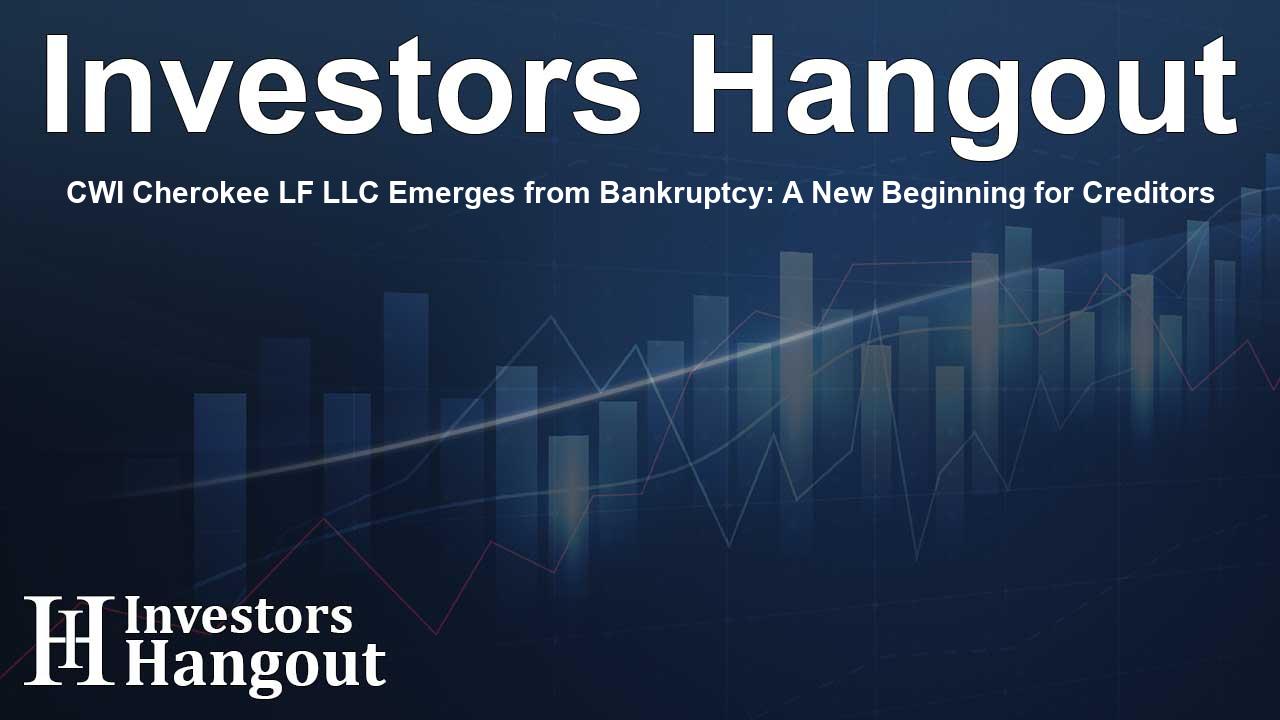CWI Cherokee LF LLC Emerges from Bankruptcy: A New Beginning for Creditors

CWI Cherokee LF LLC Emerges Stronger After Bankruptcy Resolution
CWI Cherokee LF LLC has triumphantly completed its Chapter 11 bankruptcy, marking a significant milestone in the company's journey. This successful resolution represents a notable achievement, particularly the full recovery achieved for both secured and unsecured creditors. The United States Bankruptcy Court recently confirmed CWI's Bankruptcy Reorganization Plan, thereby finalizing the process. Such a complete payout to creditors is indeed a rare occurrence in the context of bankruptcy, showcasing the effectiveness of CWI’s strategies during tough times.
Background on CWI and Financial Challenges
Earlier, CWI found itself navigating through complex waters when it filed for Chapter 11 reorganization. The operator of several waste management facilities faced significant financial turbulence, especially due to the unexpected suspension of operations at the Cherokee Landfill, which was directly linked to elevated leachate levels. The decision to seek bankruptcy protection was a strategic move designed to safeguard CWI's assets while addressing outstanding claims from creditors.
Leachate Management Issues
Managing leachate, the liquid that drains or ‘leaches’ from a landfill, posed a major challenge for CWI. Local wastewater treatment facilities refused to accept leachate from the Cherokee Landfill due to concerns over unregulated low-level PFAS constituents. This lack of acceptable disposal options forced CWI to resort to transporting leachate over 135 miles for treatment, further complicating their operational challenges and financial standing.
Strategic Business Moves During Reorganization
In October, during the bankruptcy proceedings, CWI took the monumental step of selling its leasehold interests in both the Cherokee Landfill and the Shoals MSW Transfer Station. This transaction amounted to over $28 million and provided a solid foundation for the company's reorganization. Additionally, the principal owner of CWI, Steve Witmer, sold the Huntsville Transfer Station to another waste management entity, Evergreen Environmental Partners. Together, these transactions enabled CWI to satisfy 100% of its creditors' claims.
Commitment to Sustainable Waste Management
Witmer, a seasoned veteran in the waste industry, has expressed his commitment to resolving the issues surrounding leachate treatment. He emphasizes that local wastewater treatment is vital for the well-being of communities, particularly those benefiting from cost-effective landfill services. The overall sustainability of landfill operations is crucial, and Witmer advocates for a more honest national dialogue about these challenges, which have historically been misrepresented.
A Testament to Team Dedication
The successful resolution of the bankruptcy proceedings serves as a powerful testament to the unwavering dedication and teamwork of all individuals involved. Achieving such a comprehensive outcome illustrates a new benchmark in bankruptcy resolutions, reflecting the strength and resolute integrity of CWI's reorganization efforts.
Looking Ahead: Opportunities for Growth
With the bankruptcy behind them, CWI Cherokee LF LLC is poised for new opportunities in the waste management sector. The completion of the bankruptcy reorganization process opens pathways for innovations in operational practices, particularly in addressing the pressing issue of leachate management. The company is committed to establishing partnerships that promote sustainable waste practices while ensuring environmental compliance.
In conclusion, the successful exit from bankruptcy not only restores financial stability to CWI but also fosters confidence among its creditors and clients. As they move forward, the company is focused on reinforcing its industry leadership and commitment to community welfare through responsible waste management solutions.
Frequently Asked Questions
What led to CWI Cherokee LF LLC filing for bankruptcy?
CWI filed for bankruptcy primarily due to financial challenges associated with elevated leachate levels at the Cherokee Landfill, which temporarily halted operations.
How did CWI resolve its bankruptcy?
The company successfully sold its leasehold interests in waste management facilities, enabling it to pay all creditors in full, an outstanding achievement for any bankruptcy case.
What is leachate, and why is it significant for landfills?
Leachate is the liquid that drains from landfills, which requires proper management to prevent environmental contamination and comply with regulations.
What future plans does CWI have post-bankruptcy?
CWI aims to innovate its operational approaches in waste management, focusing on sustainability and enhancing partnerships that benefit both the environment and local communities.
Who can I contact for more information about CWI?
For further inquiries, interested parties can reach out to Steve Witmer, the principal owner of CWI.
About The Author
Contact Riley Hayes privately here. Or send an email with ATTN: Riley Hayes as the subject to contact@investorshangout.com.
About Investors Hangout
Investors Hangout is a leading online stock forum for financial discussion and learning, offering a wide range of free tools and resources. It draws in traders of all levels, who exchange market knowledge, investigate trading tactics, and keep an eye on industry developments in real time. Featuring financial articles, stock message boards, quotes, charts, company profiles, and live news updates. Through cooperative learning and a wealth of informational resources, it helps users from novices creating their first portfolios to experts honing their techniques. Join Investors Hangout today: https://investorshangout.com/
The content of this article is based on factual, publicly available information and does not represent legal, financial, or investment advice. Investors Hangout does not offer financial advice, and the author is not a licensed financial advisor. Consult a qualified advisor before making any financial or investment decisions based on this article. This article should not be considered advice to purchase, sell, or hold any securities or other investments. If any of the material provided here is inaccurate, please contact us for corrections.
